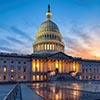 (Oct. 3, 2025) – The U.S. House of Representatives and Senate were unable to reach an agreement on a continuing resolution, and federal government funding expired at midnight on Sept. 30. The major issues and impasse between Democrats and Republicans revolved around the extension of the enhanced premium Medicare tax credits and repeal of Medicaid cuts under the One Big Beautiful Bill Act.
(Oct. 3, 2025) – The U.S. House of Representatives and Senate were unable to reach an agreement on a continuing resolution, and federal government funding expired at midnight on Sept. 30. The major issues and impasse between Democrats and Republicans revolved around the extension of the enhanced premium Medicare tax credits and repeal of Medicaid cuts under the One Big Beautiful Bill Act.
What does this mean for hospitals?
- Medicare payments to hospitals are mandatory and should be unaffected by a government shutdown.
- Medicaid is a mandatory entitlement program, and CMS has confirmed there is sufficient funding through the end of calendar year 2025. CMS's approval of Medicaid waivers and state plan amendments may be delayed during a government shutdown.
- The Rural Health Transformation Program is mandatory and not impacted by a lapse in government funding.
- Congressional action is needed to extend critical health care programs that expired on Sept. 30, including Medicare telehealth waivers and hospital-at-home programs, Work Geographic Practice Cost Index, Medicare rural ambulance add-on payments and workforce extenders. A delay of the Medicaid Disproportionate Share Hospital cuts is also needed.
- CMS issued the following guidance on the hospital care at home waiver: "For all hospitals with active [Acute Hospital Care at Home] waivers, all inpatients must be discharged or returned to the hospital on Sept. 30, 2025, in the absence of Congressional action to extend the initiative. CMS will no longer accept waiver requests for participation in the AHCAH initiative after Sept. 1."
- CMS issued temporary telehealth waivers that will expire on Wednesday, Dec. 31. These waivers include removing eligible geographic and originating site restrictions, allowing audio-only services, permitting different types of providers to administer telehealth services and continuing tele-behavioral health visits.
See AHA's Telehealth Fact Sheet for additional information.
--Jaron Caffrey